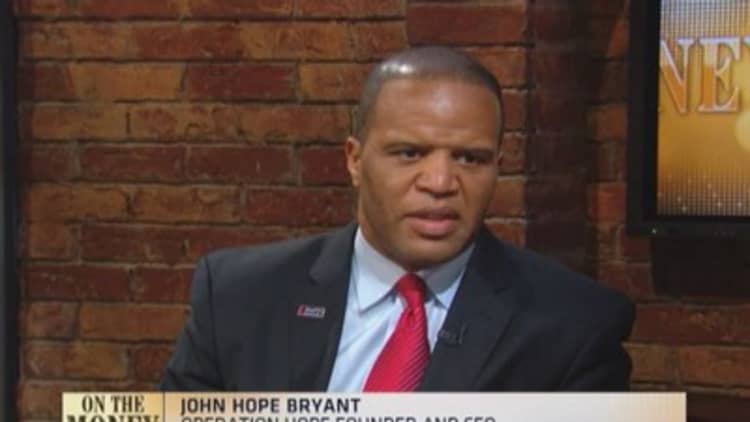
"Poverty is a state of mind," said John Hope Bryant, the entrepreneur and founder of Operation HOPE.
In his book, "How the Poor Can Save Capitalism," Bryant argued that improving lower income Americans' financial literacy—and bringing them as customers into the financial services industry—will lead to a stronger U.S. economy overall.
"If you're making $50,000 a year or less in this country, you've got too much month at the end of your money," Bryant said. According to the U.S. Census, 49.5 percent of Americans earned $50,000 or less in 2012. Roughly half of those brought home less than $25,000.
But engaging the poor and working class as active consumers who require services such as savings accounts, mortgages and credit counseling is the best way to stabilize the American economy, contends Bryant.
"People who make $50,000 a year take 90 cents of (each) dollar and put it back in the economy because they can't afford not to," Bryant said.
Read MoreHow Paul Ryan plans to tackle poverty
Bryant's Operation Hope aims to improve financial literacy among lower income Americans by building 1,000 local financial education centers inside neighborhood banks. The effort, called Project 5117, is supported by the U.S. Consumer Financial Protection Bureau, as well as the American Bankers Association, the FDIC, the Financial Services Roundtable, U.S. Small Business Administration and the Mortgage Bankers Association.
"It's not like the poor and working class, or 'teetering class' people, got the memo and screwed it up—they never got the memo on free enterprise and capitalism, so [they] are winging it," Bryant argued.
"The largest economy on the planet is just winging it when it comes to growing the economy, creating jobs, giving people aspirations," he said.
Project 5117 recently marked the opening of its first 100 "Hope Inside" locations in 200 days. Bryant called the effort "the Starbucks of financial inclusion." Offices have opened in branches of SunTrust, PNC, Fifth Third Bank and others.
"Banks are not doing this out of charity," said Bryant. "It's connecting what we call philanthropy or doing good with creating sustainable customers."
Read MoreWhat recovery? How poverty is moving to the suburbs
More than 9 million American households don't have bank accounts, according to estimates by the FDIC.
"You're not going to solve it by telling people they need a bank account," Bryant said. "What we have to do is tie that bank account to an aspiration. And growing our middle class is the whole ball game."
—By CNBC's Katie Kramer


